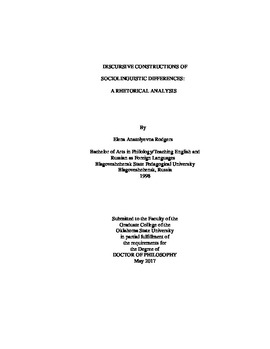| dc.contributor.advisor | Preston, Dennis Richard | |
| dc.contributor.author | Rodgers, Elena Anatolyevna | |
| dc.date.accessioned | 2018-03-13T18:16:21Z | |
| dc.date.available | 2018-03-13T18:16:21Z | |
| dc.date.issued | 2017-05 | |
| dc.identifier.uri | https://hdl.handle.net/11244/54602 | |
| dc.description.abstract | This study offers a new approach to language attitudes and ideologies which applies argumentation theory in a discourse-based analysis of the processes of sociolinguistic indexicality. This method is presented in the context of the previously-used discourse-based approaches to language attitudes which are reviewed here in terms of their contributions to the understanding of the creation of socio-indexical meanings in discourse. The review proposes a five-level typology which includes topic-oriented, linguistic, cognitive, interactional, and rhetorical levels of analysis. | |
| dc.description.abstract | This study explores the potential of the New Rhetoric theory developed by Perelman and Olbrechts-Tyteca (1969) to serve as an overarching framework which can help cohere multidisciplinary perspectives on language use and social relations in the analysis of folk-linguistic discourse. This approach allows for an analysis of the rhetorical connectedness of discursive acts that contribute to semiotic construals of folk-linguistic beliefs at different levels of discourse organization. | |
| dc.description.abstract | This dissertation proposes that a sociolinguistic study may use as a starting point of analysis a specific locally-salient folk-concept and shows that this type of analytic focus may be productive in exploring the metapragmatic functioning of folk-concepts in the context-specific activations of the fluid fields of sociolinguistic indexical relations. As a result of applying the proposed rhetorically-oriented method, this study provides new perspectives on how language users argumentatively construct conceptual associations between language-related and social representations in everyday discourse. It discusses the ways in which propositional processes of sociolinguistic indexicality engage experiential, affective, performative, perceptual, and identity-related processes: participants demonstrate these interrelated engagements in everyday metalinguistic discourse when they rationalize, justify, valorize, and illustrate their individual experiences with linguistic variability. The metapragmatic aspects of such constructions include discursive processes of objectivation, essentialization, and reification of sociolinguistic distinctiveness, as well as constructions of the clustering of linguistic and social typifications that create indexical profiles of speaking styles and index symbolic boundaries between social groups. These processes reveal how speakers appropriate the meaning potential of linguistic variables and conceptualize it in discursive constructions of linguistic distinctiveness. | |
| dc.format | application/pdf | |
| dc.language | en_US | |
| dc.rights | Copyright is held by the author who has granted the Oklahoma State University Library the non-exclusive right to share this material in its institutional repository. Contact Digital Library Services at lib-dls@okstate.edu or 405-744-9161 for the permission policy on the use, reproduction or distribution of this material. | |
| dc.title | Discursive constructions of sociolinguistic differences: A rhetorical analysis | |
| dc.contributor.committeeMember | Brooks, Ronald Clark | |
| dc.contributor.committeeMember | Caplow, Nancy Jill | |
| dc.contributor.committeeMember | Kennison, Shelia M. | |
| osu.filename | Rodgers_okstate_0664D_15208.pdf | |
| osu.accesstype | Open Access | |
| dc.type.genre | Dissertation | |
| dc.type.material | Text | |
| thesis.degree.discipline | English | |
| thesis.degree.grantor | Oklahoma State University | |
